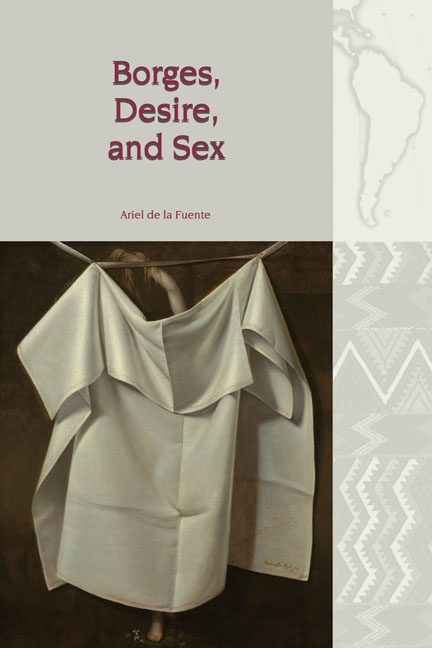Book contents
- Frontmatter
- Dedication
- Contents
- Acknowledgements
- List of Abbreviations
- Introduction
- 1 On Borges’s Sexuality
- 2 Biography in Literature and the Reading of Desire and Sex in Borges
- 3 Borges’s Erotic Library: The Poetry Shelf
- 4 Sir Richard Burton’s Orientalist Erotica: The Thousand Nights and a Night and The Perfumed Garden
- 5 Schopenhauer and Montaigne, Philosophy and Sex
- 6 Desire and Sex in Buenos Aires: Borges’s Poetry on the Arrabal
- 7 Stoicism and Borges’s Writing of Women
- 8 “Emma Zunz”: Sex, Virtue, and Punishment
- 9 “La intrusa”: Incest and Gay Readings
- Conclusions
- Works Cited
- Index
8 - “Emma Zunz”: Sex, Virtue, and Punishment
- Frontmatter
- Dedication
- Contents
- Acknowledgements
- List of Abbreviations
- Introduction
- 1 On Borges’s Sexuality
- 2 Biography in Literature and the Reading of Desire and Sex in Borges
- 3 Borges’s Erotic Library: The Poetry Shelf
- 4 Sir Richard Burton’s Orientalist Erotica: The Thousand Nights and a Night and The Perfumed Garden
- 5 Schopenhauer and Montaigne, Philosophy and Sex
- 6 Desire and Sex in Buenos Aires: Borges’s Poetry on the Arrabal
- 7 Stoicism and Borges’s Writing of Women
- 8 “Emma Zunz”: Sex, Virtue, and Punishment
- 9 “La intrusa”: Incest and Gay Readings
- Conclusions
- Works Cited
- Index
Summary
So far my reading of Borges's women has not included, except for few earlier references, Emma Zunz, his best-known female character and the one who has been fundamental in the explanations tried by critics. “Emma Zunz” is a short story of classic detective format that tells the tale of a young Jewish Argentine woman whose father was betrayed by his business partner, Aarón Loewenthal. The latter embezzeled money from their firm but falsely accused Mr. Zunz of the crime. Apparently unable to defend himself, the innocent victim goes into exile in Brazil, where he dies in shame and solitude. Loewenthal's treason is devastating for the family, and its economic ruin forces Emma to take a job as a worker in the factory of her father's enemy. Thus, Emma decides to settle accounts with the scoundrel (now also her boss), and with this goal in mind, she carefully prepares a plan that will allow her both to punish Loewenthal and to avoid any legal consequences. The subtle plot conceived by the 19-year-old woman includes losing her virginity, which she does when she pretends to be a prostitute and has sex with a foreign mariner (a complete stranger to her).
Most of the interpretations of the story have revolved around the scene of Emma's sexual intercourse with the sailor, and critics have focused on the thoughts of the narrator on the sex life of her parents. In his psychoanalytical reading, Julio Woscoboinik asserts that Emma's revenge is motivated by the guilt caused by her parents's sexual relationship; Beatriz Sarlo's interpretation says that Emma's experience with her own body makes her aware of the sexual violence her father inflicted on her mother, which gives her revenge a second, additional motivation; for their part, Aguilar and Jelicié understand Emma's vengeful plan as an opportunity for the young woman to imagine an incestuous sex act with her own father; and Edwin Williamson proposes that the story shows a woman “trapped in a labyrinth of sexual strife.” Without ignoring this influential scene, Josefina Ludmer, however, reads the text in a political key and proposes that Emma's revenge represents “todas las justicias,” including the one deserved by women and the working class (the worker settles accounts with the boss).
- Type
- Chapter
- Information
- Borges, Desire, and Sex , pp. 173 - 186Publisher: Liverpool University PressPrint publication year: 2018

